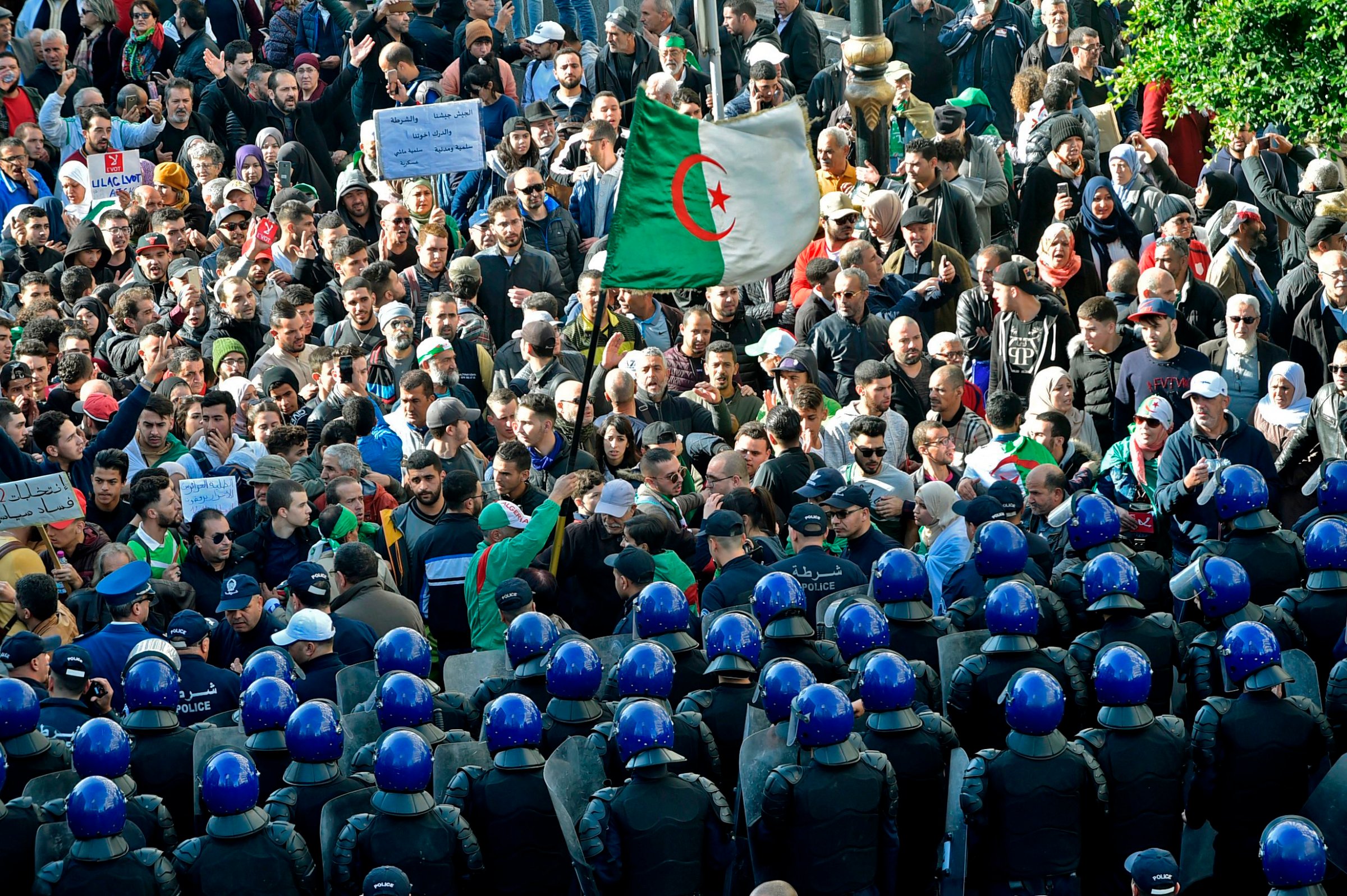
Algeria is pressing ahead with elections on Thursday despite almost 10 months of mass demonstrations against its political system, near blanket opposition from non-governmental organizations, and the expectation that millions of Algerians will decline to vote.
On Dec 12. Algerians have the option to select one of five candidates approved by Algeria’s interim president Abdelkader Bensalah and his military backers. But Algeria’s popular protest movement known as Hirak—an Arabic word meaning mobilization—says these candidates all belong to the old guard, with ties to former president Abdulazziz Bouteflika’s regime.
In office for almost two decades, Bouteflika, 82, was a leader in name only after suffering a debilitating stroke in 2013. In February, Bouteflika announced he would seek a fifth term in office. Appalled, millions took to the streets in mass protests demanding a total overhaul of the political system that has been in place since Algeria won independence from France in 1962. Bouteflika’s resignation in April did little to appease the popular movement, which saw the aging leader as a front for a shadowy network of politicians, military officials and business people who wield power over the country’s politics and finances.
Algeria’s elections are taking place on Thursday against a backdrop of 42 consecutive weeks of protests. Here’s what to know.
Why is Algeria holding elections now?
Dec. 12 marks the third time this year Algeria has attempted to hold presidential elections. After Bouteflika resigned and elections slated for April were scrapped, a vote to elect his successor was meant to take place in July. That too was called off after Algeria’s constitutional court ruled out two candidates that had been put forward.
The army regards an election as the only way to resolve Algeria’s political impasse and this month’s vote comes after Algeria’s military chief of staff urged the interim president to publish a decree allowing elections before the end of the year. While the chief of staff is a publicly recognizable figure, it is the military leaders behind him that are Algeria’s powerbrokers, according to Dalia Ghanem, a resident scholar at the Carnegie Middle East Center. “Under the guise of preserving the constitution, they have been steering the transition by imposing elections and have been using the judiciary to purge regime opponents and keep allies in line,” she wrote recently.
Who are the candidates running in the elections?
All five of the candidates the state has approved to run are men over 50 with ties to the Bouteflika era. The two frontrunners, Abdelmadjid Tebboune and Ali Benflis, served as prime ministers under Bouteflika. Algeria’s current Minister for Culture is a third contender, and a fourth, an Islamist who served as Minister for Tourism between 1997 and 1999. A televised debate between the five candidates—the first of its kind in Algeria—was held on Dec. 6, but elicited widespread mockery from Algerians on social media.
Young Algerians have focused on statements from Bengrina, in particular, to highlight how absurd they consider the campaign. Central to his platform is a bid to end women’s celibacy, which he has said is “dangerously increasing.” Women would be much better off if they “discovered the joys of marriage,” even if that means being a third or fourth spouse, Bengrina has argued, according to Carnegie’s Ghanem.
How many people are expected to vote?
No foreign observers are in Algeria to monitor the vote but turnout is expected to be low. TNearly all Algerian political and civil organizations have declined to endorse any of the five candidates put forward and have urged people not to vote. Algerians living in France, the United Kingdom, and several cities across the United States have also rallied to discourage their fellow expatriates from voting. On Dec. 8, San Francisco-based Algerians claimed that only 14 of some 3,000 people the electoral roll there had cast a vote.
Despite that, last month marches organized by the General Union of Algerian Workers (UGTA) intended to show solidarity with the government mustered more than 10,000 people to the streets across several cities in Algeria, Reuters reports.
How have Algerian authorities responded to the protests?
From the outset, Hirak has been characterized by its staunch commitment to peaceful protest f. Still, Algeria has increasingly clamped down on dissent in the run-up to elections, arresting and detaining hundreds. Since the campaign officially opened on November 17, at least eight protesters have been convicted and imprisoned and 15 others are in pre-trial detention on vague charges, Human Rights Watch reports. In August, police detained Human Rights Watch representative Ahmed Benchemsi while he was observing pro-democracy protests in Algiers, eventually deporting him from the country.
What will the result mean for Algeria?
It may depend on how many people show up to vote. Protesters have vowed to continue their demonstrations no matter who is elected on Dec. 12, but a very low turnout would make it near-impossible for Bouteflika’s successor to assert his legitimacy. That could ultimately galvanize the Hirak to force a political upheaval. It could also prompt the military to intervene and put down the popular movement.
More Must-Reads from TIME
- Why Biden Dropped Out
- Ukraine’s Plan to Survive Trump
- The Rise of a New Kind of Parenting Guru
- The Chaos and Commotion of the RNC in Photos
- Why We All Have a Stake in Twisters’ Success
- 8 Eating Habits That Actually Improve Your Sleep
- Welcome to the Noah Lyles Olympics
- Get Our Paris Olympics Newsletter in Your Inbox
Write to Joseph Hincks at joseph.hincks@time.com